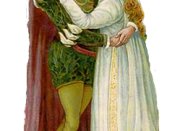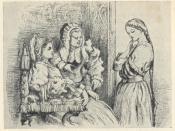Juliet's speech in Act 4, Scene 3, filled with much classic Shakesperean imagery, is a turning point in the play for Juliet in which she wrestles with the conflicts in her life and then ultimately comes to a decision. It encompasses all the major themes in the play and many ideas all come together for the first time in this passage. First of all, this soliloquy deals with fear, of what will happen if she takes the potion and of what will happen if she doesn't. Secondly, it concerns time, specifically the recurring night and darkness motif. Thirdly, it discusses love and death, the two major contrasting themes. Lastly, it introduces or reintroduces other opposites, such as reality versus appearance, which was the major metaphor in Juliet's earlier speech.
If one had to summarize this speech in just a few words, one would say it was an inner monologue about fear, in which Juliet worries about all the possible problems that could befall her.
When she says "I have a faint cold fear thrills through my veins, that almost freezes up the heat of life", she is saying that she has a bad feeling something unfortunate is going to happen that may result in death. She even says, "God knows when we shall meet again" which shows that she isn't sure what terrible consequences there may be from drinking the potion. Initially she worries "What if it do not work at all?" and that she'll have to "be married then to-morrow morning" with Paris. Then, she becomes afraid that it's a poison, which the friar "subtly hath minister'd to have me dead" so that he should not be punished for marrying her to Romeo. Next, she fears that she should awaken before Romeo arrives. Here, she imagines...


